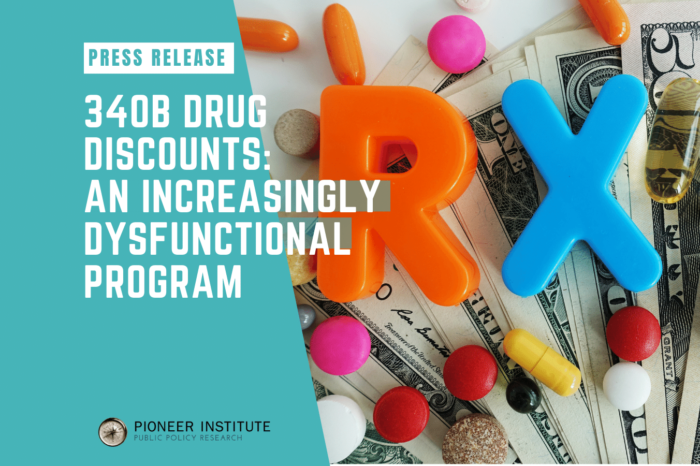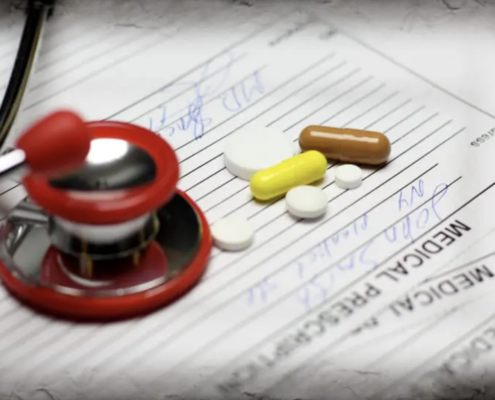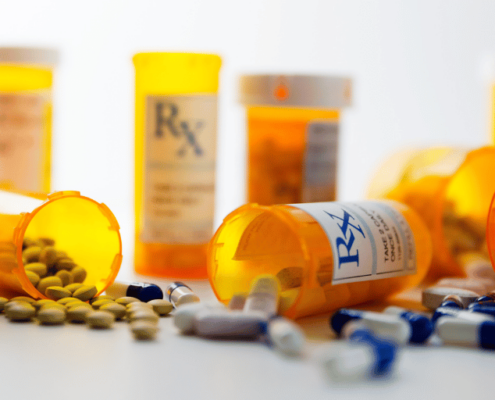Massachusetts Hospitals Pull Back on Charity Care as Revenue from Federal 340B Drug Discount Program Explodes
BOSTON, MA – Over the past decade, the revenue for hospitals generated by the federal 340B drug discount program, initially intended to serve low-income, uninsured populations, has exploded even while a number of important Massachusetts hospitals have reduced the level of charity care they provide, according to a new study published by Pioneer Institute. The Pioneer Institute study, “340B Drug Discounts: An Increasingly Dysfunctional Program,” notes that nationwide, 340B drug sales rose from $9 billion in 2014 to $38 billion in 2020.
“The 340B drug discount program started with the best of intentions: to make high-quality prescription drugs and healthcare more affordable to low-income, uninsured populations,” said Dr. Bill Smith, Pioneer Institute Director of the Life Sciences Initiative and co-author, with Pioneer Senior Fellow Josh Archambault, of the study. “The 340B program has, unfortunately, been transformed into a lucrative revenue stream for hospitals and pharmacies who can arbitrage drug discounts. With the exception of a small number of dedicated hospitals and clinics, the original goals of the program have largely been lost.”
WATCH: WEBINAR: “340B Program: Examining Patient Access to Affordable Medicines”
On March 22, Pioneer held a discussion on the efficacy and efficiency of the 340B program, with Pioneer’s Dr. William Smith, as well as nationally-recognized speakers Terry Wilcox, Executive Director of Patients Rising, and Robert Popovian, Vice President of Health Economics and Policy for Equideum Health.
The Pioneer report also highlights numerous problems with the 340B program, noting that it has “served to enrich for-profit pharmacy chains and pharmacy benefit managers (PBMs), weakened community-based physician and oncology care, pushed patients into more expensive hospital-based care, incentivized the system toward more expensive therapies—all while providing fewer and fewer services to the low-income uninsured.”
The report includes a number of federal and state policy recommendations to improve the 340B program, such as tighter definitions of patient eligibility and charity care, and more extensive transparency and reporting requirements commensurate with the status of these institutions as nonprofit entities. The report argues that the nonprofit tax treatment of hospitals, as well as their participation in the 340B program, should lend itself to more generous provision of charity care for vulnerable populations.
“Given the huge growth in revenues deriving from the 340B program, we would expect to see significant expansions in the provision of charity care and services for lower-income populations from these hospitals, as that was the intent of the program,” said Pioneer Senior Fellow Josh Archambault. “Unfortunately, we’ve seen the opposite scenario play out with 340B. Certain institutions appear to be triple dipping, taking the additional money that comes with taxpayer funded expansions of coverage, reducing their charity care amounts, and at the same time exploiting the 340B program to maximize revenue, which should be stable or going down with each expansion of coverage as more individuals have health coverage.”
You can read the full Pioneer Institute report here.
Watch: Hubwonk360 Host Joe Selvaggi talks with William Smith about the 340B Program
About the Authors
William S. Smith is Senior Fellow and Director of the Life Sciences Initiative at Pioneer Institute. He has 25 years of experience in government and in corporate roles, including as vice president of public affairs and policy at Pfizer, and as a consultant to major pharmaceutical, biotechnology and medical device companies. He held senior staff positions for the Republican House leadership on Capitol Hill, the White House, and in the Massachusetts Governor’s office. He earned his PhD with distinction at The Catholic University of America (CUA).
Josh Archambault is President and Founder of Presidents Lane Consulting. He is a Senior Fellow at Pioneer Institute, as well as Cicero Institute. His work experience has ranged from work as a Senior Legislative Aide to a governor, Legislative Director for a state senator, to years working for think tanks operating in thirty-five states, and in D.C. He is a regular contributor to the influential Forbes.com blog, The Apothecary. Josh holds a master’s in public policy from Harvard University’s Kennedy School of Government and a B.A. in political studies and economics from Gordon College.
About Pioneer Institute
Pioneer’s mission is to develop and communicate dynamic ideas that advance prosperity and a vibrant civic life in Massachusetts and beyond. Pioneer’s vision of success is a state and nation where our people can prosper and our society thrive because we enjoy world-class options in education, healthcare, transportation and economic opportunity, and where our government is limited, accountable and transparent. Pioneer values an America where our citizenry is well-educated and willing to test our beliefs based on facts and the free exchange of ideas, and committed to liberty, personal responsibility, and free enterprise.
Get Updates On Our Life Sciences Work!
Related Content













